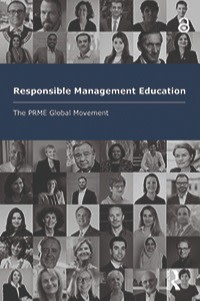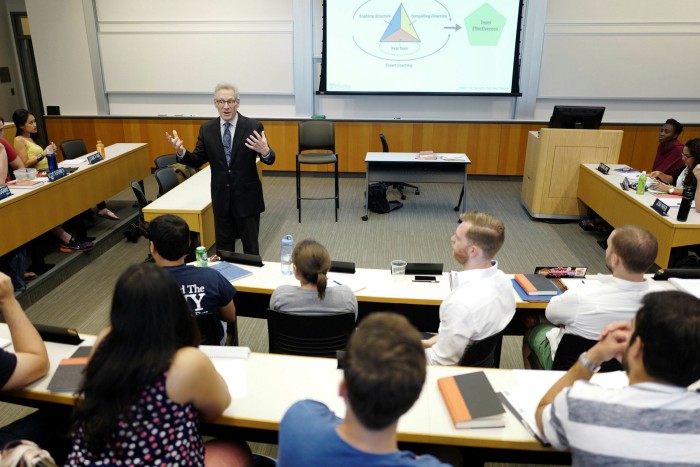Books: Rewriting business education

Roula Khalaf, Editor of the FT, selects her favourite stories in this weekly newsletter.
When Piet Naudé addressed fellow business school deans in a seminar at the Frankfurt School of Finance and Management, he posed an unexpected question: “How many of you wake up in the morning and realise that defending democracy is part of your task today?”
While schools around the world teach many shared skills to students with common aspirations, there are important nuances by geography and culture. In Contemporary Management Education, Naudé, whose training was in theological ethics, gives a polemical voice notably to institutions in his native South Africa, where until recently he was director of the University of Stellenbosch Business School.
Some of the questions he says will shape the future of management education — and the world to which it must respond — would resonate with that gathering in Frankfurt and his counterparts elsewhere in Europe and North America, such as those around technology and leadership.
But he also points to trends especially relevant in Africa and other emerging nations, albeit now being discussed more widely around the world. These include the role of the market, purpose, good, decolonisation, ecology and inequality.

Naudé argues that business schools should question the status quo and mobilise for justice. He describes going on a march with colleagues to protest at the corruption of South Africa’s disgraced former president Joseph Zuma, and a colleague invited to lecture in China — once sensitive passages in his chosen textbook were blanked out.
Working in a country on the front line of climate change with among the highest levels of inequality in the world, Naudé brings an important critical perspective to the role of business education. He warns about the commodification of higher education and hugely unequal access, and that “the enormous social esteem accorded to successful graduates results in a meritocratic hubris that assumes they made it by themselves”.
Addressing decolonisation, he seeks a shift away from African and “indigenous management” research and teaching (often by westerners) which marginalises other regions. Yet he cautions against the extreme position that all science is a western construct to be questioned.
Many may disagree with his priorities and analysis — or the role of business schools in the reforms he seeks — but his book is a sobering addition to the debate.
Responsible Management Education, edited by Mette Morsing, provides a summary of the activities of the UN Principles for Responsible Management Education (PRME) network established in 2007. More than 800 business schools have signed up to six standards around purpose, values, method, research, partnership and dialogue to promote sustainability and responsibility.

The country with the largest number of institutions on board is the US, although Europe leads by continent, with the UK topping the list as a share of its total number of schools.
One graph highlights the shift in discussion by business and society away from shareholder-focused profit maximisation, illustrated by a surge in articles from the mid-1980s in leading international media (topped by the FT) that include the word “stakeholder”.
There is clearly growing demand from students, faculty and employers to tackle the issues. For example, Paul Polman, the former Unilever chief executive who has championed sustainability and is a PRME board member, writes that business schools “sit at the nexus of society, their research informs and inspires and their teaching prepares new leaders for the challenges of the future”.
Global MBA ranking 2022

Find out which schools are in our ranking of MBA degrees. Learn how the table was compiled and read the rest of our coverage at www.ft.com/mba.
Yet with 800 business schools signed up out of 15,000 globally, there is far to go. As another author points out, Republicans — who tend to be far more suspicious of UN initiatives — strongly outnumber Democrats among chief executives in the US, reflecting views that may dissuade deans from signing up to PRME.
Some chapters read more like minutes of meetings of regional PRME chapters than clear analyses or recommendations. But the book is available free online, which means those with the patience can identify interesting initiatives. These include Sulitest, designed to test students’ knowledge around sustainability; the Carbon Literacy Project to offer resources for teaching; and AIM2Flourish, which gets students to interview business leaders who have overseen successful and profitable innovations linked to the UN’s Sustainable Development Goals.
One challenge touched on but not fully addressed is the ambiguity about what responsibility or purpose really means, and how it should be reflected in teaching, research and operations.
Another issue insufficiently explored — despite criticism of business school rankings focused on salary outcomes — is any consensus about more alternative consistent, quantifiable, outcomes-based measures linked to responsible management. These are challenges for PRME and for business education as a whole.
Contemporary Management Education: Eight Questions That Will Shape its Future in the 21st Century, by Piet Naudé, Springer, £59.99
Responsible Management Education: The PRME Global Movement, edited by Mette Morsing, Routledge, £120; open access download at taylorfrancis.com/books/9781032030296
Comments